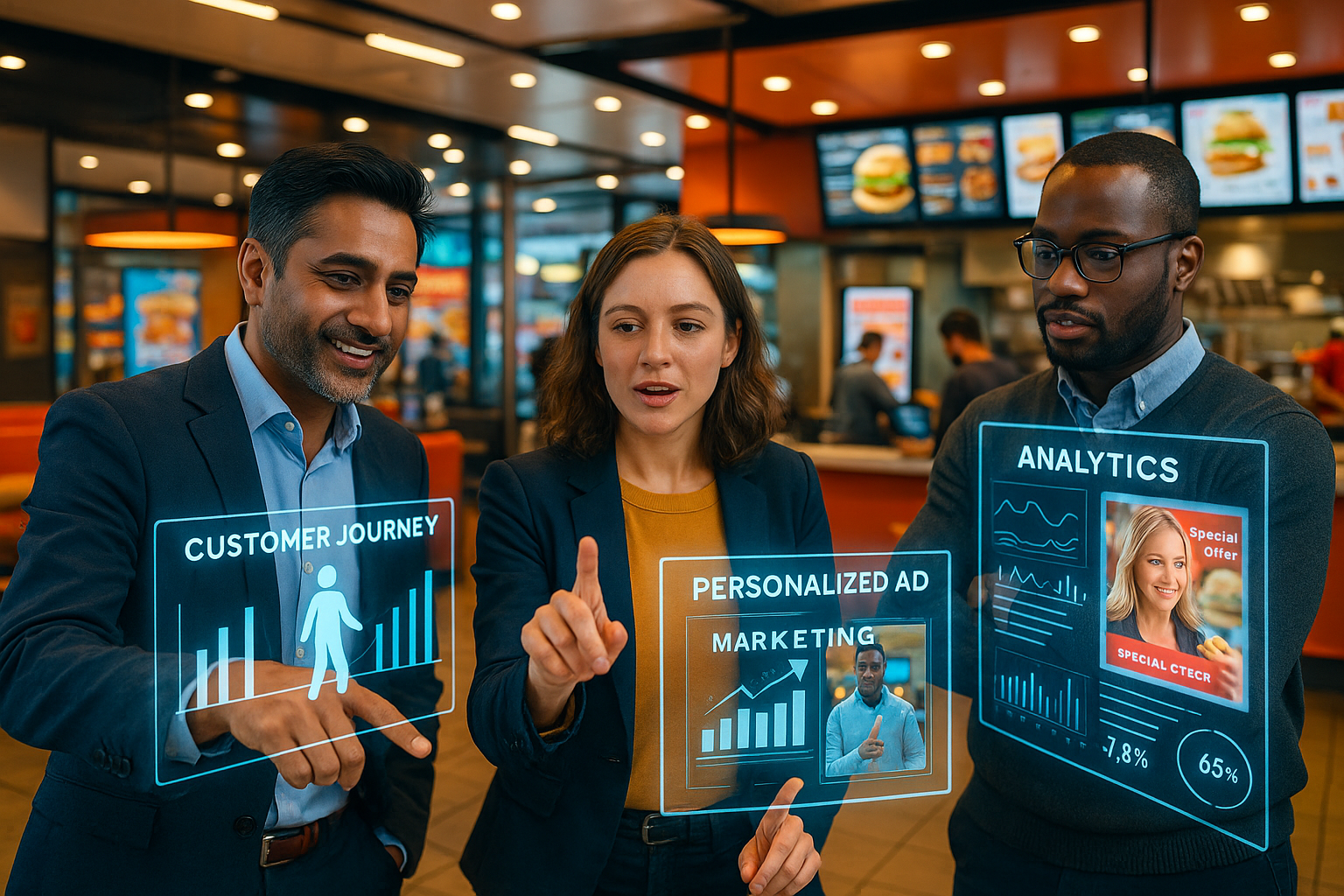
From Fast Food to Future-Proof: How AI is Reshaping Marketing (and How Your Team Can Leverage It)
In today’s hyper-competitive landscape, every marketing dollar counts. Businesses are constantly seeking ways to connect with customers more effectively, drive sales, and build lasting loyalty. At Spark AI Strategy, we believe that staying ahead in the AI landscape requires more than just awareness—it demands actionable insights. Our mission is to distill the latest developments into strategic guidance that empowers businesses to harness AI effectively. Today, we spotlight Yum Brands’ innovative use of AI in marketing, a move that’s not only enhancing customer engagement but also setting a new standard in the fast-food industry.
Yum Brands, the powerhouse behind KFC, Taco Bell, and Pizza Hut, is reporting impressive results from its AI-driven marketing campaigns. By leveraging artificial intelligence to deeply analyze customer data and precisely tailor marketing efforts, Yum has achieved a notable increase in customer purchases and a reduction in churn across its restaurant chains. This strategic application of AI underscores the undeniable potential for technology to drive tangible business outcomes, even for smaller competitors looking to make a significant impact.
Decoding Yum’s AI Marketing Playbook: Lessons for Your Team
Yum’s success isn’t magic; it’s a testament to the power of AI when applied thoughtfully to marketing challenges. Here’s a deeper look at the AI strategies major brands are employing, and how marketing teams of all sizes can adapt these principles:
- Hyper-Personalization at Scale:
- The Big Picture: Yum Brands, like Starbucks and McDonald’s, uses AI to create highly personalized experiences. This involves analyzing vast amounts of customer data – including browsing behavior, purchase history, and even loyalty program interactions – to deliver tailored offers and recommendations. Imagine sending a discount on a customer’s favorite latte or suggesting new breakfast items to a regular breakfast buyer.
- Your Action Plan: Marketing teams can leverage AI to personalize emails based on abandoned carts or browsing history, or to recommend products based on past views and purchases. Even with smaller datasets, AI tools can help segment your audience more effectively and craft messages that truly resonate with individual preferences, leading to higher engagement and conversions.
- Predictive Analytics for Churn Reduction & Retention:
- The Big Picture: Yum reports a reduction in churn, a critical metric for any business. AI uses predictive analytics to identify customers at risk of leaving before they churn. It analyzes behaviors like reduced app usage, declining email open rates, or decreased purchase frequency to flag at-risk individuals.
- Your Action Plan: Implement AI-powered tools that monitor customer behavior for churn signals. When a risk is detected, automate personalized re-engagement emails or alerts for your customer success team to reach out. This proactive approach can significantly boost customer lifetime value (CLV) and revenue predictability.
- Enhanced Customer Interaction and Support:
- The Big Picture: KFC has famously deployed AI-powered chatbots like “Kiri” on WeChat to engage customers conversationally, answer queries, and even facilitate voice-driven ordering. Brands are using AI to provide 24/7 customer support and streamline interactions.
- Your Action Plan: Explore AI-powered chatbots and virtual assistants for your website or social media channels. These tools can handle routine customer inquiries, provide instant answers to FAQs, and guide users through the customer journey, freeing up your human team for more complex tasks. This not only improves efficiency but also elevates the customer experience by providing immediate, consistent support.
- Content Creation & Optimization for Marketing Campaigns:
- The Big Picture: Beyond personalized messaging, AI assists in generating engaging content, including augmented reality filters and virtual reality experiences. Generative AI can produce marketing assets like social media posts, sales emails, blog content, and subject lines, ensuring brand consistency across channels.
- Your Action Plan: Utilize generative AI tools to assist with content brainstorming, drafting email bodies, and creating multiple iterations of campaign materials. AI can also optimize send times for emails and test various campaign variants simultaneously (A/B testing) to maximize impact. This saves time and resources, allowing your team to focus on strategic oversight and creativity.
- Data-Driven Decision Making & Automation:
- The Big Picture: AI enables marketers to process massive datasets quickly, identifying micro-segments, predicting future customer actions, and optimizing budgets. Yum’s success is rooted in its ability to analyze customer data and tailor efforts.
- Your Action Plan: Integrate AI tools that provide predictive analytics, automate repetitive marketing tasks like campaign scheduling and audience segmentation, and offer real-time insights into campaign performance. This automation leads to faster execution, fewer manual errors, and more agile marketing operations, helping your team make data-informed decisions quickly.
The AI Advantage for Every Marketer
The success of Yum’s AI initiatives serves as a compelling case study for businesses across industries. It illustrates how integrating AI into marketing strategies can lead to improved customer experiences and operational efficiencies. For smaller businesses or those with leaner marketing teams, AI isn’t a distant dream; it’s an accessible tool that can level the playing field. Many AI marketing tools are available today that can help with content creation, social media management, email optimization, and data analysis.
However, it’s also a reminder of the importance of implementing AI responsibly, with considerations for data privacy and ethical use. As AI continues to evolve, companies that thoughtfully integrate these technologies will be better positioned to meet the changing expectations of their customers and maintain a competitive edge.
Are you ready to unlock the full potential of AI for your marketing team? What’s the first AI-powered marketing strategy you plan to implement?
Ready to transform your marketing with AI? Contact Spark AI Strategy today for advanced AI marketing training and custom solutions!
Bibliography
- YUM Brands Using AI to Improve Marketing and Sales 2063f1a85b278019ac3ae242bf7a47ed.md (Original provided document)
- Agility PR Solutions. (2025, April 1). Revolutionizing food marketing: How Starbucks and McDonald’s use digital strategies to stay ahead of the curve. Retrieved from https://www.agilitypr.com/pr-news/content-media-relations/revolutionizing-food-marketing-how-starbucks-and-mcdonalds-use-digital-strategies-to-stay-ahead-of-the-curve/
- DigitalDefynd. (2025). 5 Ways KFC Is Using AI [Case Studies][2025]. Retrieved from https://digitaldefynd.com/IQ/ways-kfc-is-using-ai/
- http://Copy.ai . (2025, February 19). AI Tools to Slash Customer Churn Rates. Retrieved from https://www.copy.ai/blog/ai-tools-for-reducing-churn
- CMS Wire. (2025, March 12). AI Can Predict Customer Churn, But Can It Build Trust?. Retrieved from https://www.cmswire.com/digital-marketing/ai-can-predict-customer-churn-but-can-it-build-trust/
- http://newecom.ai . (2025, January 15). Using AI to Anticipate and Reduce Customer Churn in eCommerce. Retrieved from https://blog.newecom.ai/using-ai-to-anticipate-and-reduce-customer-churn-in-ecommerce/
- http://Originality.ai . (2025, May 24). 6 Tips For Using AI in B2C Marketing. Retrieved from https://originality.ai/blog/ai-for-b2c-marketing
- MartechLive. (2025, April 11). How B2C Brands are Leveraging AI to Personalize Customer Experiences in 2025. Retrieved from https://martechlive.com/b2c-brands-use-ai-for-personalization/
- AIQB. (2025, February 7). How AI Personalizes Marketing for B2B and B2C Businesses. Retrieved from https://www.aiqbq.com/post/how-ai-personalizes-marketing-for-b2b-and-b2c-businesses
- Pipedrive. (2025, May 1). 20 best AI marketing tools for small businesses in 2025. Retrieved from https://www.pipedrive.com/en/blog/small-business-using-ai-for-marketing
- Delve AI. (2025). 23 Best AI Marketing Tools in 2025 (Pros, Cons, & Pricing). Retrieved from https://www.delve.ai/blog/ai-marketing-tools
- Park University. (2025, June 2). The Role of AI in Modern Marketing. Retrieved from https://www.park.edu/blog/the-role-of-ai-in-marketing/
- IBM. (2025, March 10). AI in Marketing. Retrieved from https://www.ibm.com/think/topics/ai-in-marketing





Leave a Reply